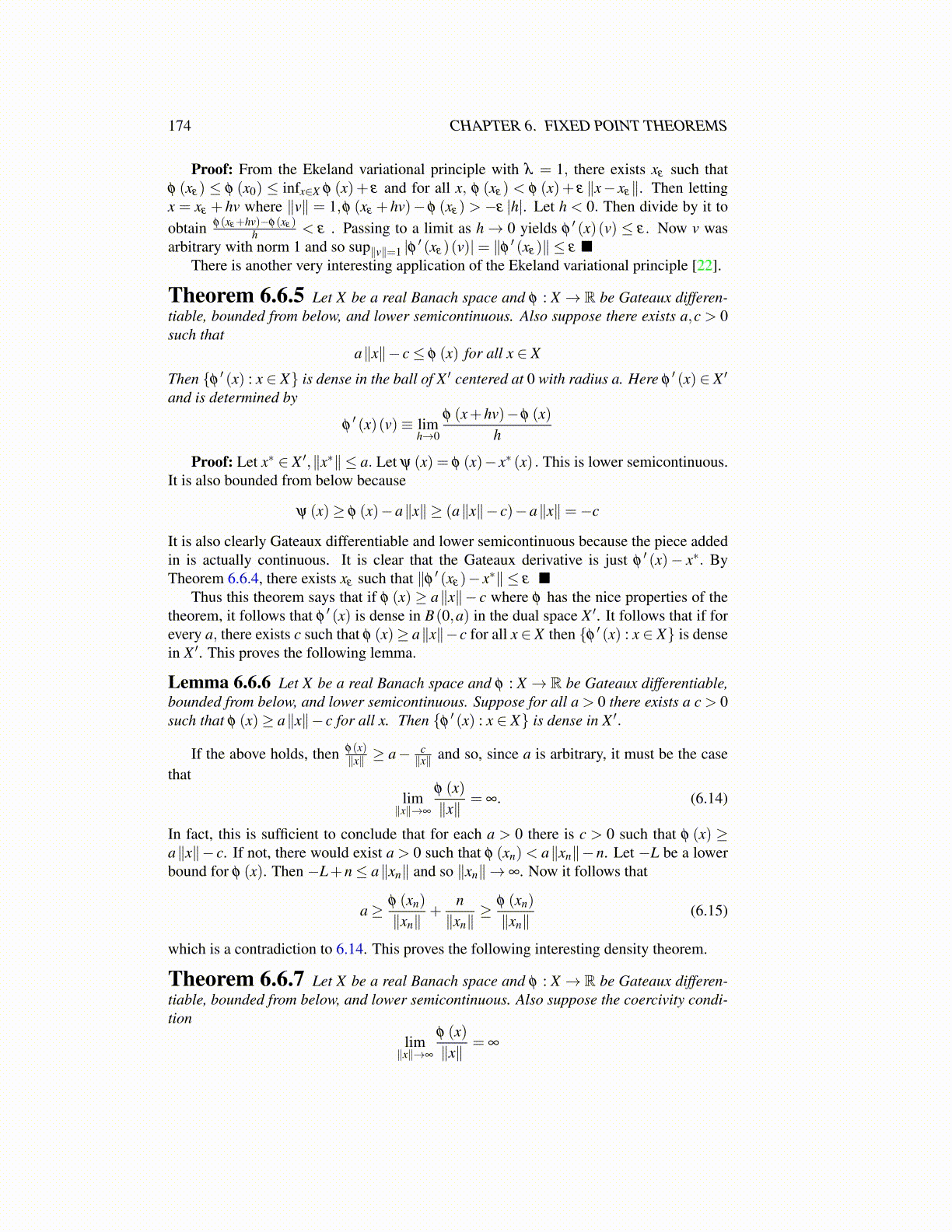
174 CHAPTER 6. FIXED POINT THEOREMS
Proof: From the Ekeland variational principle with λ = 1, there exists xε such thatφ (xε) ≤ φ (x0) ≤ infx∈X φ (x)+ ε and for all x, φ (xε) < φ (x)+ ε ∥x− xε∥. Then lettingx = xε + hv where ∥v∥ = 1,φ (xε +hv)−φ (xε) > −ε |h|. Let h < 0. Then divide by it toobtain φ(xε+hv)−φ(xε )
h < ε . Passing to a limit as h→ 0 yields φ′ (x)(v) ≤ ε . Now v was
arbitrary with norm 1 and so sup∥v∥=1 |φ ′ (xε)(v)|= ∥φ ′ (xε)∥ ≤ ε ■There is another very interesting application of the Ekeland variational principle [22].
Theorem 6.6.5 Let X be a real Banach space and φ : X → R be Gateaux differen-tiable, bounded from below, and lower semicontinuous. Also suppose there exists a,c > 0such that
a∥x∥− c≤ φ (x) for all x ∈ X
Then {φ ′ (x) : x ∈ X} is dense in the ball of X ′ centered at 0 with radius a. Here φ′ (x) ∈ X ′
and is determined by
φ′ (x)(v)≡ lim
h→0
φ (x+hv)−φ (x)h
Proof: Let x∗ ∈ X ′,∥x∗∥ ≤ a. Let ψ (x) = φ (x)−x∗ (x) . This is lower semicontinuous.It is also bounded from below because
ψ (x)≥ φ (x)−a∥x∥ ≥ (a∥x∥− c)−a∥x∥=−c
It is also clearly Gateaux differentiable and lower semicontinuous because the piece addedin is actually continuous. It is clear that the Gateaux derivative is just φ
′ (x)− x∗. ByTheorem 6.6.4, there exists xε such that ∥φ ′ (xε)− x∗∥ ≤ ε ■
Thus this theorem says that if φ (x) ≥ a∥x∥− c where φ has the nice properties of thetheorem, it follows that φ
′ (x) is dense in B(0,a) in the dual space X ′. It follows that if forevery a, there exists c such that φ (x)≥ a∥x∥−c for all x ∈ X then {φ ′ (x) : x ∈ X} is densein X ′. This proves the following lemma.
Lemma 6.6.6 Let X be a real Banach space and φ : X → R be Gateaux differentiable,bounded from below, and lower semicontinuous. Suppose for all a > 0 there exists a c > 0such that φ (x)≥ a∥x∥− c for all x. Then {φ ′ (x) : x ∈ X} is dense in X ′.
If the above holds, then φ(x)∥x∥ ≥ a− c
∥x∥ and so, since a is arbitrary, it must be the casethat
lim∥x∥→∞
φ (x)∥x∥
= ∞. (6.14)
In fact, this is sufficient to conclude that for each a > 0 there is c > 0 such that φ (x) ≥a∥x∥− c. If not, there would exist a > 0 such that φ (xn)< a∥xn∥−n. Let −L be a lowerbound for φ (x). Then −L+n≤ a∥xn∥ and so ∥xn∥→ ∞. Now it follows that
a≥ φ (xn)
∥xn∥+
n∥xn∥
≥ φ (xn)
∥xn∥(6.15)
which is a contradiction to 6.14. This proves the following interesting density theorem.
Theorem 6.6.7 Let X be a real Banach space and φ : X → R be Gateaux differen-tiable, bounded from below, and lower semicontinuous. Also suppose the coercivity condi-tion
lim∥x∥→∞
φ (x)∥x∥
= ∞